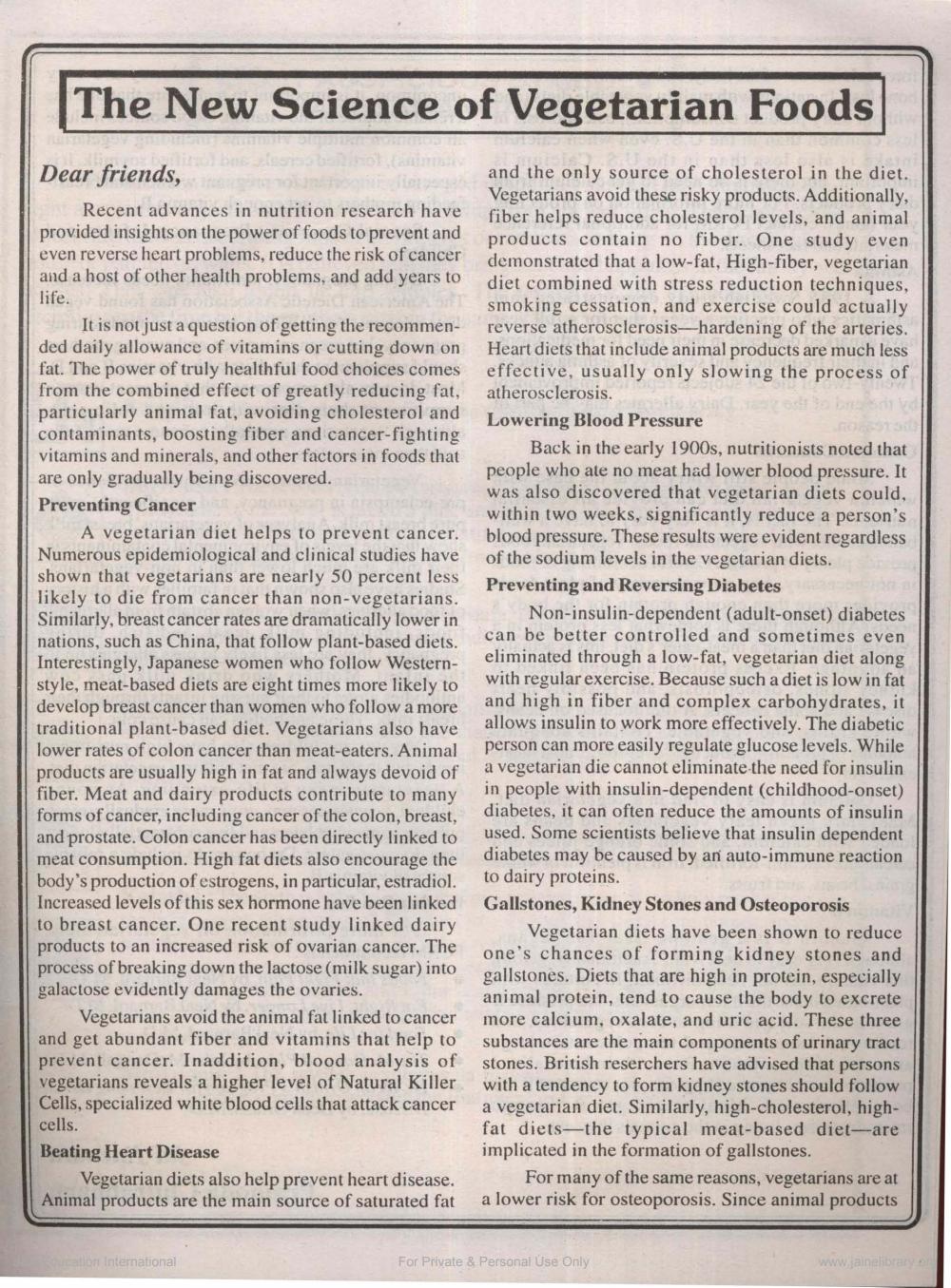________________
The New Science of Vegetarian Foods
Dear friends,
Recent advances in nutrition research have provided insights on the power of foods to prevent and even reverse heart problems, reduce the risk of cancer and a host of other health problems, and add years to life.
It is not just a question of getting the recommended daily allowance of vitamins or cutting down on fat. The power of truly healthful food choices comes from the combined effect of greatly reducing fat, particularly animal fat, avoiding cholesterol and contaminants, boosting fiber and cancer-fighting vitamins and minerals, and other factors in foods that are only gradually being discovered. Preventing Cancer
A vegetarian diet helps to prevent cancer. Numerous epidemiological and clinical studies have shown that vegetarians are nearly 50 percent less likely to die from cancer than non-vegetarians. Similarly, breast cancer rates are dramatically lower in nations, such as China, that follow plant-based diets Interestingly, Japanese women who follow Westernstyle, meat-based diets are eight times more likely to develop breast cancer than women who follow a more traditional plant-based diet. Vegetarians also have lower rates of colon cancer than meat-eaters. Animal products are usually high in fat and always devoid of fiber. Meat and dairy products contribute to many forms of cancer, including cancer of the colon, breast, and prostate. Colon cancer has been directly linked to meat consumption. High fat diets also encourage the body's production of estrogens, in particular, estradiol. Increased levels of this sex hormone have been linked to breast cancer. One recent study linked dairy products to an increased risk of ovarian cancer. The process of breaking down the lactose (milk sugar) into galactose evidently damages the ovaries.
Vegetarians avoid the animal fat linked to cancer and get abundant fiber and vitamins that help to prevent cancer. Inaddition, blood analysis of vegetarians reveals a higher level of Natural Killer Cells, specialized white blood cells that attack cancer cells. Beating Heart Disease
Vegetarian diets also help prevent heart disease. Animal products are the main source of saturated fat
and the only source of cholesterol in the diet. Vegetarians avoid these risky products. Additionally, fiber helps reduce cholesterol levels, and animal products contain no fiber. One study even demonstrated that a low-fat, High-fiber, vegetarian diet combined with stress reduction techniques, smoking cessation, and exercise could actually reverse atherosclerosis-hardening of the arteries. Heart diets that include animal products are much less effective, usually only slowing the process of atherosclerosis. Lowering Blood Pressure
Back in the early 1900s, nutritionists noted that people who ate no meat had lower blood pressure. It was also discovered that vegetarian diets could, within two weeks, significantly reduce a person's blood pressure. These results were evident regardless of the sodium levels in the vegetarian diets. Preventing and Reversing Diabetes
Non-insulin-dependent (adult-onset) diabetes can be better controlled and sometimes even eliminated through a low-fat, vegetarian diet along with regular exercise. Because such a diet is low in fat and high in fiber and complex carbohydrates, it allows insulin to work more effectively. The diabetic person can more easily regulate glucose levels. While a vegetarian die cannot eliminate the need for insulin in people with insulin-dependent (childhood-onset) diabetes, it can often reduce the amounts of insulin used. Some scientists believe that insulin dependent diabetes may be caused by an auto-immune reaction to dairy proteins. Gallstones, Kidney Stones and Osteoporosis
Vegetarian diets have been shown to reduce one's chances of forming kidney stones and gallstones. Diets that are high in protein, especially animal protein, tend to cause the body to excrete more calcium, oxalate, and uric acid. These three substances are the main components of urinary tract stones. British reserchers have advised that persons with a tendency to form kidney stones should follow a vegetarian diet. Similarly, high-cholesterol, highfat diets-the typical meat-based diet--are implicated in the formation of gallstones.
For many of the same reasons, vegetarians are at a lower risk for osteoporosis. Since animal products
on International
For Private & Personal Use Only




